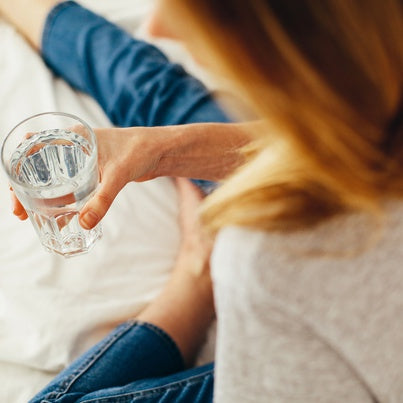
16.10.18
HOW IMPORTANT IS IT TO FILTER YOUR TAP WATER?
For us, living our best life means being thoughtful about what we put in our bodies. Which got us thinking: we consume more water each day than we do anything else. And tap water is not only affordable and convenient, but it also arrives plastic-free. So, we decided to get to the bottom of a question we’ve had for quite some time: Should we be filtering our tap water?
We had the pleasure of speaking with an expert on the subject, Nneka Leiba, Director of Healthy Living Science at the Environmental Working Group (EWG). Long story short? Yes, according to EWG, everyone in the U.S. should be running their tap water through some kind of filter. Everyone!
The good news? Buying a great filter for your home won’t break the bank. But more on that later.

“Last year, EWG concluded a decade’s long analysis that found hundreds of contaminants in the U.S. drinking water,” says Ms. Leiba. “Many of which are linked to cancer plus reproductive and developmental issues.”
Officially, the tap water in the U.S. is safe to drink. Yes, our water has contaminants – most of them agricultural- and industrial-borne – but federal and state governments keep these contaminants at healthy levels. In theory, drinking tap water is not dangerous to our health. Unfortunately, Ms. Leiba says it’s not that peachy.
“The vast majority of consumers don’t know this. But legal limits are set not just on what is
healthy but on feasibility and cost,” she says. “If a certain chemical is hazardous to your health but also very costly to remove, the legal limit increases.”
She says part of the issue is that we don’t protect our source water. “Industrial and agricultural pollutants can freely enter our waterways,” she says. “Which means the utilities have to add more and more chemicals to get the contaminants to a level below what is required by the EPA.”

Chlorine, a chemical commonly used to disinfect public water, is a big part of the problem. “When water has anything organic in it — decaying leaves or trees, manure — the chlorine reacts to form disinfectant byproducts. Many of which have been linked to cancer,” she says.
Here in the Bay Area, most of our water comes from snowmelt that flows into the Hetch Hetchy watershed in Yosemite National Park. There’s no two ways about it, our tap water is downright delicious. We were curious, is better tasting water safer to drink?
“The way water tastes mostly has to do with its mineral content,” says Ms. Leiba. “Hard water" tastes harsh because it contains more minerals. The icky things in water we want to avoid don’t necessarily have a taste.
We found this news to be rather alarming. Staying hydrated is fundamental to our health. In case you haven’t checked lately, experts now recommend men and women drink 15.5 and 11.5 cups of water a day, respectively.

Luckily, it turns out household filters are both cheap and effective.
“We at EWG believe tap water is a perfectly good resource if you have the appropriate filter on your tap,” says Ms. Leiba.
Carbon activated filters – many of which run in the $20 - $30 range – do a great job at removing most contaminants. Brita water pitchers, for example, use a carbon activated filter.
EWG has made it their mission to help consumers buy the right water filter. They used data from 30 million water utility records across the U.S. to create a tap water database. Just enter your zip code to see what contaminants have been found in your area. They also have a water filter guidelines page where you are given all the information you need to make an informed purchase.
In the city of San Francisco, EWG found only three contaminants above healthy limits. While many areas in the country have far more to worry about, SF did test positive for Chromium-6, the same cancer-causing element Erin Brokovich famously sued PG&E over.
Even if your area happens to come up clean of contaminants, EWG urges the use of a filter. “It’s unclear for most areas if water travels through lead-based pipes before it arrives in your tap,” she says. “It’s always beneficial to run your water through a filter.”

We Went Grocery Shopping With a Natural Chef and Nutrition Consultant
When we’re making our weekly round at the grocery store, we often find ourselves debating if we should toss a certain item in the cart. Anyone els... READ MORE

How to Keep Your Wellness Routine During Wedding Season
Spring has officially sprung. We love filling our vases up with seasonal daffodils and filling our refrigerator door up with wedding invitations. ... READ MORE

What This Pilates Instructor Eats to Stay Energized All Day
It’s one thing to be in class with your favorite fitness instructor, carefully watching, listening, and following their every cue. But what if you... READ MORE
